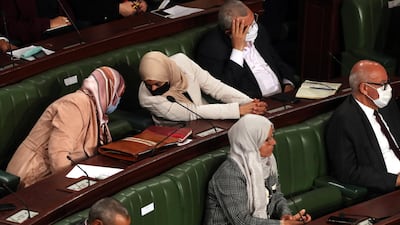Violent scenes erupted in Tunisia’s parliament on Monday morning as deputies from the left-leaning Democratic Bloc were attacked by rival MPs from the Islamist Al Karama (Dignity) Coalition.
Five major Tunisian parties made an unprecedented call for parliamentary immunity to be lifted to allow prosecution of the members of the hardline religious party.
Qalb Tounes, the Islah Bloc, the Tahya Tounes and the unaffiliated MPs held a press conference on Monday evening calling for Al Karama Coalition members to face charges over the violence in parliament.
According to several officials present at the altercation, members of the Democratic Bloc were attacked while trying to call for an investigation into comments by an Al Karama Deputy regarding women in Tunisian society, which many considered misogynistic.
Democratic Bloc president Mohamed Ammar, who was there at the time, told The National that MPs from the Al Karama Coalition became verbally abusive before five members – including coalition leader Seif Eddine Makhlouf – began physically attacking them. High-profile MP Samia Abbou was among those attacked. Mr Ammar said she was kicked during the assault.
Video footage of the incident, live-streamed to Facebook by MP Meriam Laghmani appeared to corroborate some of Mr Ammar’s account.
Images of MP Annouar Benchahed's bleeding face subsequently went viral on Tunisian social media after he was reportedly hit by a bottle during the fracas. He is reported to be suing Mr Makhlouf for suggesting his injuries were inflicted by the nails of fellow Democratic deputy Amira Charfeddine, who was also caught up in the violence.
"The Al Karama [Coalition members] weren’t angry about one thing in particular," Mr Ammar said. "They just didn't want any [investigation] to take place. They consider, (Al Karama MP Mohamed Affes’) comments as part of freedom of expression. But his speech was an attack on women."
On December 4, Mr Affes gave an address in parliament in which he said that single mothers in Tunisia were either promiscuous or had been assaulted, inciting anger in parliament when fellow deputies branded the comments misogynistic.
Parliament Speaker Rachid Ghannouchi and President Kais Saied condemned the violence.
In a written statement, Mr Ghannouchi, the leader of the self-styled Muslim democratic Ennahda movement, denounced "any form of violence” but stopped short of naming Al Karama Coalition.
Mr Saied later met a delegation of MPs from the Democratic Bloc, including a number of those injured.
"It's not about waiving Al Karama's immunity," Mr Ammar said. "Now, we need a clear condemnation of the party."
He rejected Mr Ghannouchi's characterisation of the attack, which he regarded as dismissive.
"As head of the [parliament], he should condemn Al Karama and name the people who were involved in the fight. The whole assembly should do so," he said.
But Al Karama Coalition and Mr Makhlouf were defiant in the face of the backlash, mocking the injuries they inflicted on fellow MPs and criticising President Saied for meeting members of the Democratic Bloc before an investigation could determine the full facts of the matter.
In a video, Mr Makhlouf said that they no longer recognise Mr Saied as Tunisia’s president after the meeting.
Al Karama Coalition is no stranger to controversy since it was formed in February 2019 in response to what its members saw as Ennahda's abandonment of more hardline Islamist positions.
Even before it was formed, Mr Makhlouf had established a reputation as a defender of those accused of religious extremism, including those involved in acts of terrorism.
After the murder of French secondary schoolteacher Samuel Paty outside Paris in October, independent MP Rached Khiari, elected under the colours of Al Karama, praised the actions of his killer on social media and called for a boycott of all French goods.
Throughout what is proving to be a volatile parliamentary session, Al Karama MPs have fought running battles with pre-revolutionary continuation party, the PDL, which have frequently spilt over into insults.
In the closing days of November, Mr Makhlouf also brandished a vial in parliament that he claimed was a domestically produced Tunisian cure for coronavirus.
The vial later proved to be a herbal remedy with no proven ability to cure Covid-19 but was manufactured by a company Mr Makhlouf was reported to represent.

